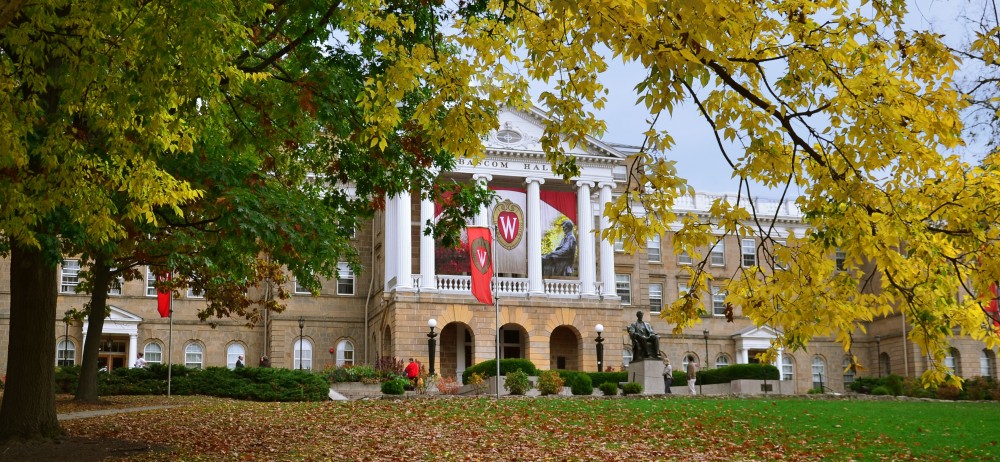Twenty-three percent of University of Wisconsin’s students of color often feel “excluded,” compared to only nine percent of white students, according to the Campus Climate Survey report released today.
The survey, conducted during the fall semester of 2016, also found that most students in almost every group feel welcome and accepted on campus.
“Approximately 80 percent of students reported very or extremely often feeling safe, welcome, and respected,” the report says. “70 percent felt like they belong very or extremely often. However, while 81 percent of students overall felt welcome on campus, the same was true for only 69 percent of LGBQ students, 67 percent of students with a disability, 65 percent of students of color, and 50 percent of trans/non-binary students. Similarly, 69% percent of students overall felt as though they belong on campus, but this feeling was shared by only 56% of students with a disability, 51 percent of LGBQ students, 50 percent of students of color, and 35 percent of trans/non-binary students.”
The report also found that 11 percent of students said they’d experienced “incidents of hostile, harassing, or intimidating behavior directed at them personally.” That would mean more than 4,500 students had experienced hostility or harassment on campus. Of those, only sixteen percent said they reported those incidents to someone in authority at UW.
“I think this is the most concerning part of this report,” said UW Chancellor Rebecca Blank in a conference call with reporters. “It’s one reason that we wanted to make our bias reporting system more accessible and transparent.”
UW Chief Diversity Officer Patrick Sims also noted that the university has recently hired a full-time coordinator for the bias reporting system.
“This is crucial feedback from the people who experience life on this campus on a very personal, emotional level every day,” Sims said in a statement. “To the students who reported negative experiences, I would say, ‘We’ve heard your concerns very clearly, and we will use this data to make our campus a more just and inclusive place.’”
Blank also noted that most students understand the value of diversity. Nearly three out of four students said it is very or extremely important to them that UW-Madison has a strong commitment to diversity and Four out of five students indicated that valuing diversity is very or extremely important to one’s future success and that they often try to create a welcoming environment for other students here at UW-Madison.
“That gives us something to build on,” Blank said.
In the fall of 2016, all undergraduate, graduate, professional and non-degree-seeking students were invited to take the survey of nearly 200 questions; 8,652 students did, a 21 percent response rate. The full results are available at diversity.wisc.edu/climate/survey.
Sims and Dean of Students Lori Berquam led a task force that studied the survey results and issued a set of recommendations. Those include:
- Promoting instructional best practices that ensure an inclusive learning environment;
- Boosting recruitment of underrepresented students, faculty and staff and making sure we retain them; and
- Increasing the capacity of students, faculty and staff to intervene in response to hostile, harassing and intimidating behavior.
The task force recommendations expand on the campus Diversity Framework and its 2015 implementation plan, called R.E.E.L. Change. A few key campus initiatives that are already underway:
- In its second year, “Our Wisconsin,” a community-building program that aims to equip students with the skills to live and work effectively in a diverse world, expanded to about 7,000 students this fall, up from 1,000 its pilot year.
- The School of Education developed The Discussion Project, a professional development opportunity beginning this fall to help faculty and academic staff members facilitate high-quality classroom discussion and engage all students. Additional training on classroom inclusion has also been provided to teaching assistants.
- The Badger Promise initiative began this fall to help first-generation Wisconsin students afford a UW–Madison education. The effort is expected to boost enrollment of low-income and underrepresented students.
- The Dean of Students office created the full-time position of bias response and advocacy coordinator last spring to oversee the university’s Bias Reporting Process. The process itself was recently enhanced to be more responsive and transparent.
To track progress, University officials said the survey will be repeated, likely in 2021.
Members of the campus community will have numerous opportunities in the months ahead to ask questions about the survey and campus climate generally, beginning with the annual Diversity Forum on Nov. 7 at Union South, 1308 W. Dayton St. It features nationally known keynote speakers, breakout sessions, and a town hall meeting. It is free and registration is required.
Additionally, the university will hold public information sessions on December 4 at the Multicultural Student Center from 6:30 to 8 pm, and at the Second and Third Shift Diversity Forum from 11:00 pm until 12:30 am.










